This document summarizes a paper that reflects on GDNet's experience building knowledge management capacity among research institutes in developing countries. It discusses a 2007 conference in Cairo that examined challenges like creating synergy between technological and social knowledge management approaches, prioritizing limited resources, promoting local knowledge creation and ownership, sharing knowledge sharing experiences, addressing inequities in access to knowledge, and facilitating partnerships. The document reviews how relevant these challenges remain today and describes how GDNet continues working to build capacity through activities like workshops, online platforms, and partnerships.
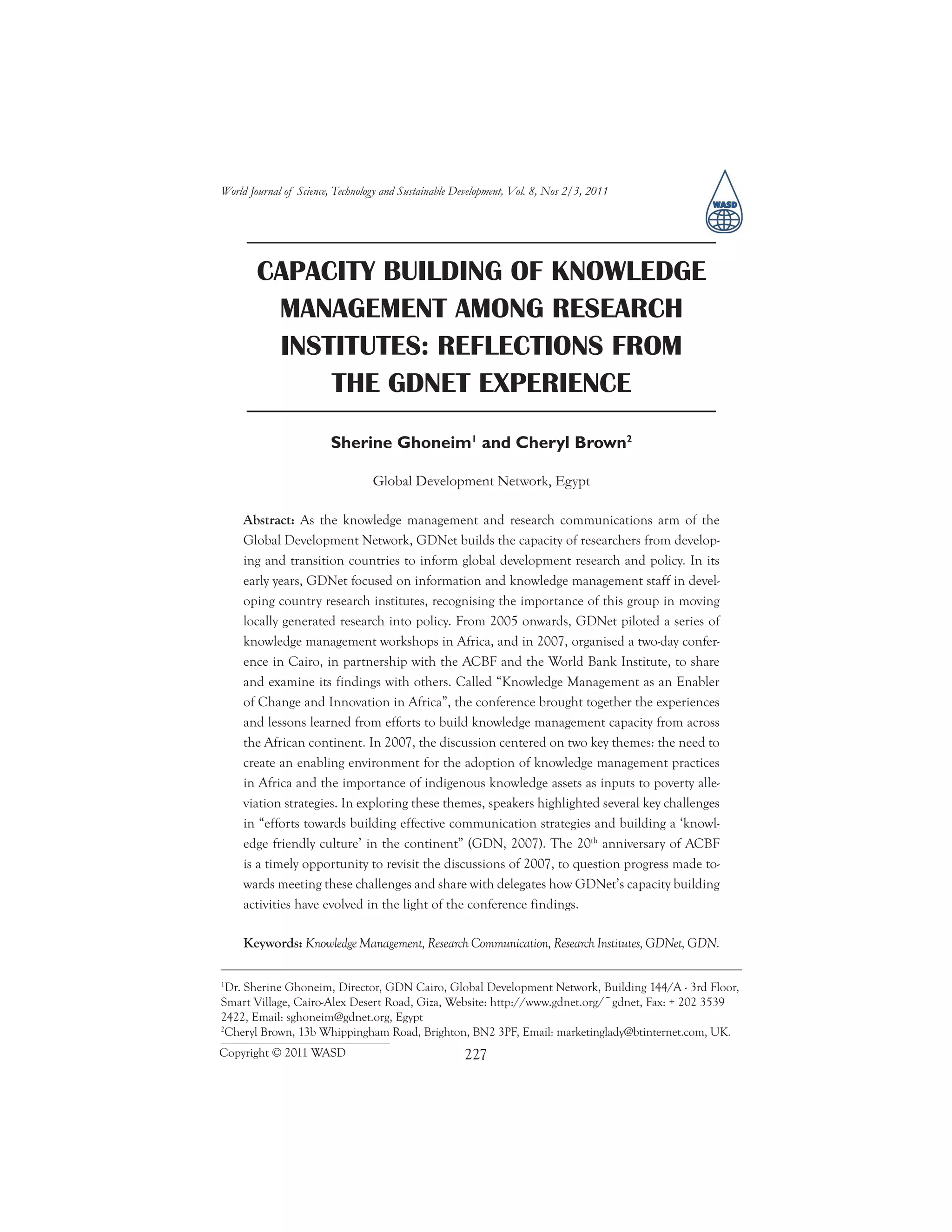
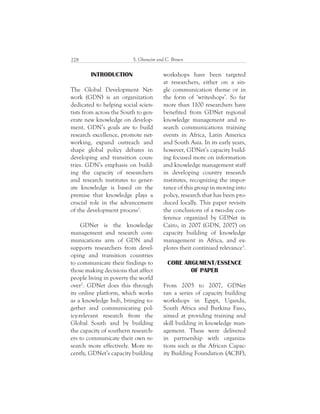
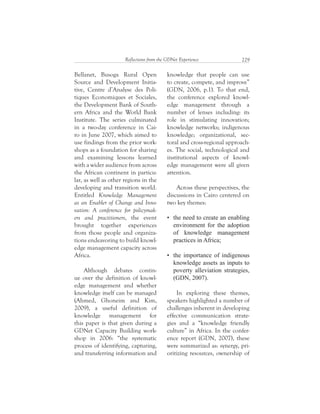
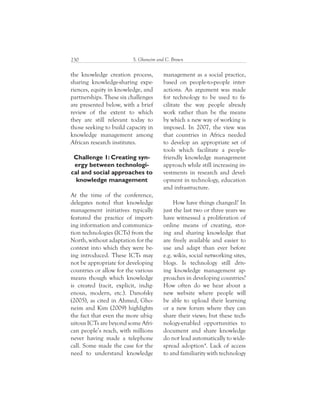
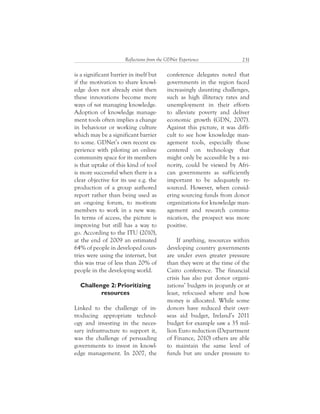
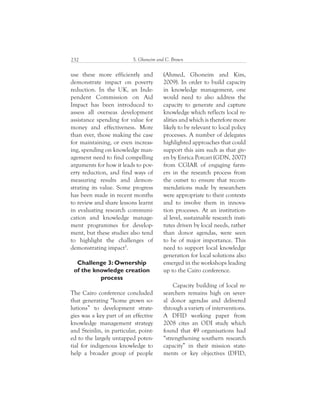
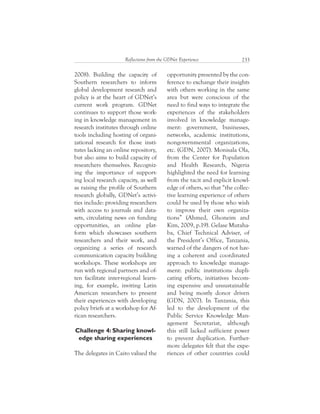
![S. Ghoneim and C. Brown234
of knowledge management) are be-
ing evaluated. The top case stud-
ies will be presented at an event
planned for March 2011 in Wash-
ington DC, aimed at encourag-
ing exchanges between knowledge
management practitioners.
GDNet itself has continued
to organize workshops that build
capacity in knowledge manage-
ment and draws on the experi-
ences of other organizations in
the region, and beyond. ‘Spaces
for Engagement’ is a partnership
between GDNet and the Center
for the Implementation of Pub-
lic Policies Promoting Equity
and Growth (CIPPEC) in Latin
America, that uses knowledge
management to improve the link
between research and policy. Out-
puts include study papers, a hand-
book on knowledge management
and monitoring and evaluation
(M&E) of the influence of re-
search in policy, an online course
on policy influence planning and
a regional workshop on M&E in-
volving leading think tanks in the
region to facilitate the sharing of
experiences.
Challenge 5: Equity in
knowledge
Issues of equality in knowledge
creation and use for development
be used to speed up the develop-
ment of knowledge management
practices in Africa if mechanisms
existed to support this.
As this 20th ACBF conference
demonstrates, the demand to learn
about the experiences of other or-
ganizations and other countries in
implementing knowledge manage-
ment programs is still present. The
KM4Dev network6
of practitioners
in knowledge management for de-
velopment continues to thrive and
its peer-reviewed journal Knowl-
edge Management for Development7
is
in its seventh volume. Since 2007,
a number of forums that aim to
share good practice in knowledge
management and exchange ideas
have emerged or become strength-
ened. One of the most recent of
these is the Knowledge Brokers
Forum8
which aims to “foster a
global community of peers inter-
ested in [Knowledge Brokering]
from a diversity of sectors and
practices, consolidate information
and resources on intermediar-
ies and help promote experiences
and refine practices in knowledge
brokering and knowledge transla-
tion”. While the ACBF Confer-
ence is taking place, entries into
the Knowledge Management Im-
pact Challenge9
(a USAID-fund-
ed competition to identify good
practice in measuring the impact](https://image.slidesharecdn.com/wjstsdv8n232011ghoneimbrown-140610053132-phpapp02/85/Building-Capacity-in-Research-Communication-and-Knowledge-Management-The-GDNet-Experience-8-320.jpg)
![235Reflections from the GDNet Experience
“African contribution to interna-
tional academic research in ICTD
[ICT for development] is very
low, typically between 1% and
9% percent of publications across
subdisciplines,” (Gitau, Plantin-
ga and Diga, 2010, p.5) suggest-
ing that theories about ICT for
development in Africa are being
formulated without local research
informing them adequately. In a
domain dominated by develop-
ment research from the North,
GDNet helps research from the
South to become more visible by
providing southern researchers
with a platform to profile their
work and opportunities to engage
with others working in develop-
ment policy and practice. Devel-
oping relationships and establish-
ing links with decision makers is
a natural step in the policy mak-
ing process. GDNet encourages
researchers to reach out to policy
makers and offers advice on how
best to engage with them on a
range of issues. GDNet also pro-
vides southern researchers with
guidance and support on how to
write policy relevant materials.
Particular emphasis is placed on
monitoring and evaluation in the
current GDNet work program
with baselines being produced
to measure indicators such as the
level of use of southern research,
attitudes to its quality, and the
were of particular concern to the
participants of the Cairo confer-
ence. Keynote speaker, Ismail Se-
rag Eldin, Director of the Biblio-
theca, Alexandrina referred to the
ever increasing gaps between “the
haves and have-nots in the knowl-
edge creation process” (Ahmed,
Ghoneim and Kim, 2009). Fac-
tors such as unequal access to
and ability to use technology,
and lack of nurturing of innova-
tion in education systems, were
identified as problems in ensur-
ing that there is a level knowledge
playing field and attention was
drawn to the dearth of articles
authored by African researchers
within journals focused on Af-
rican research (GDN, 2007). In
GDNet’s experience, one barrier
to publication in academic jour-
nals is access to the international
research journals needed for refer-
encing; something it aims to over-
come through partnerships with
JSTOR, Project MUSE and the
British Library for Development
Studies that give free access to
journals for southern researchers
in southern research institutes.
This inequality between the
“haves” and “have nots” in de-
velopment research creation and
use continues and is a major driv-
er for GDNet’s work program.
A recent study found that the](https://image.slidesharecdn.com/wjstsdv8n232011ghoneimbrown-140610053132-phpapp02/85/Building-Capacity-in-Research-Communication-and-Knowledge-Management-The-GDNet-Experience-9-320.jpg)
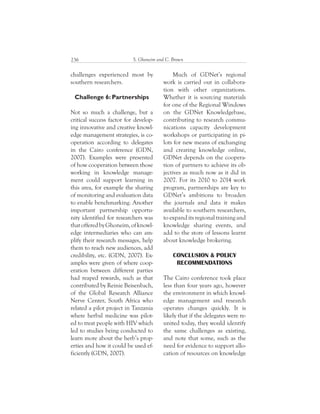
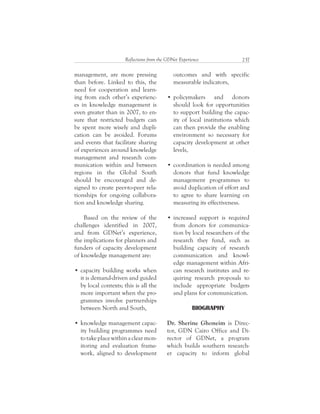
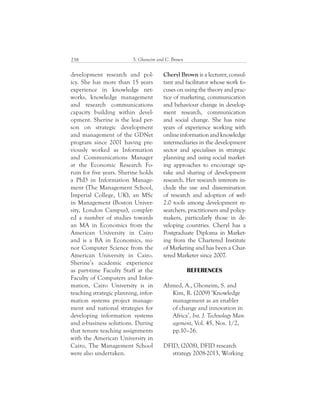
![239Reflections from the GDNet Experience
Management Capacity for Afri-
can Research Institutes and Net-
works: East Africa Workshop,
GDN, Cairo, Egypt, http://
cloud2.gdnet.org/cms.
php?id=east_africa_workshop
International Telecommunica-
tion Union (ITU). World
Telecommunication/ICT Devel-
opment Report (2010) Monitor-
ing the Wsis Targets: A mid-
term review, ITU, Geneva,
Switzerland.
Knowledge Brokers Forum, [on-
line], http://www.knowledge-
brokersforum.org/ [Accessed,
January 17, 2011]
Knowledge Management for De-
velopment, [online], http://
www.km4dev.org/ [Accessed,
January 17, 2011]
Knowledge Management Impact
Challenge, [online], http://
kdid.org/kmic [Accessed,
January 17, 2011]
Research Information Network,
(2010). If you build it, will the
come? How researchers perceive
and use web 2.0 [pdf] London:
Research Information Net-
work. http://www.rin.ac.uk/
our-work/communicating-
and-disseminating-research/
Paper Series: Capacity Build-
ing, DFID, London, UK,
http://www.dfid.gov.uk/
r4d/SearchResearchData-
base.asp?OutputID=176824
Department of Finance, (2010),
Summary of 2011 Budget Mea-
sures Policy Changes, http://
www.budget.gov.ie/bud-
gets/2011/Documents/
Summary%20of%20Mea-
sures%20Combined.pdf
Gitau, S., Plantinga, P. and
Diga, K. (2010) ICTD Re-
search by Africans: Origins,
Interests, and Impact, draft
manuscript presented at
ICTD 2010 Conference,
London, http://www.shi-
koh.org/custom/Gitau%20
et%20al.pdf
Global Development Network
(GDN) Conference Report
(2007). Knowledge Manage-
ment as an Enabler of Change
and Innovation: A Conference
for Policymakers and Practi-
tioners, GDN, Cairo, Egypt,
http://cloud2.gdnet.org/
cms.php?id=knowledge_man-
agement_conference
Global Development Net-
work (GDN) Workshop
Report (2006). Knowledge](https://image.slidesharecdn.com/wjstsdv8n232011ghoneimbrown-140610053132-phpapp02/85/Building-Capacity-in-Research-Communication-and-Knowledge-Management-The-GDNet-Experience-13-320.jpg)
![S. Ghoneim and C. Brown240
of the key presentations of the
GDN Conference in Cairo.
4
A recent study from the UK
(Research Information Net-
work, 2010), a country in
which researchers typically have
reliable internet access, looks at
the rate of adoption of web 2.0
tools by UK researchers and
finds a number of barriers to
uptake among this group.
5
See for example, Research com-
munication: Insights from practice,
a working paper of the Research
Communication Strategy Group,
edited by I. Carter and K. Pau-
lus, 2010, http://www.dfid.gov.
uk/r4d/SearchResearchData-
base.asp?OutputID=185051
6
http://www.km4dev.org/
7
http://www.tandf.co.uk/jour-
nals/titles/19474199.asp
8
http://www.knowledgebrokers-
forum.org/
9
http://kdid.org/kmic
use-and-relevance-web-20-re-
searchers
Taylor and Francis. Knowledge
Management for Development
Journal. [online] http://www.
tandf.co.uk/journals/ti-
tles/19474199.asp
NOTES
1
See http://cloud2.gdnet.org/
cms.php?id=about_gdn for
more about the Global Devel-
opment Network.
2
See http://www.gdnet.
org/~gdnet for more details of
the GDNet programme.
3
In summarising the key chal-
lenges identified by delegates
this paper draws on the con-
ference report (GDN, 2007)
authored by Sherine Ghone-
im (GDNet) and Ronald Kim
(World Bank Institute). See
also Ahmed, Ghoneim and
Kim, 2009, which also consid-
ers the six challenges identi-
fied, and presents a summary](https://image.slidesharecdn.com/wjstsdv8n232011ghoneimbrown-140610053132-phpapp02/85/Building-Capacity-in-Research-Communication-and-Knowledge-Management-The-GDNet-Experience-14-320.jpg)